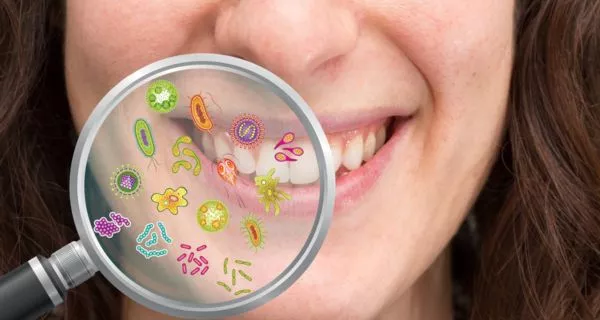Last Updated on: 2nd January 2026, 06:34 am
Good oral hygiene helps protect the whole body. When you brush and clean your teeth every day, you lower the risk of cavities, gum disease, and bad breath. Clean teeth also prevent bacteria from moving into the body and causing heart, lung, or other health problems. A healthy mouth supports a healthy life. Taking care of your mouth is essential for protecting the entire body.
Oral health is very important for your whole body and how you live. It’s not just about a pretty smile. Why?
- Good oral health helps you eat and talk well.
- It affects how you feel around other people.
- Your mouth health and body health are connected.
Oral diseases such as caries, periodontitis, and other disorders of the soft tissues of the oral cavity can have serious consequences on the body. The relationship between poor oral hygiene and severe diseases highlights the importance of maintaining good oral health.
What is the importance of maintaining a good oral hygiene routine?

Good oral hygiene is very important because it helps prevent many problems before they start. When you take care of your teeth and gums every day, you protect your mouth and also the whole body.
With good oral care, you can prevent:
- cavities
- gum disease
- bad breath (halitosis)
- other oral infections
Furthermore, there is a direct connection between oral health and the general health of the body.
For example, if you have an infection in your mouth:
- Bacteria can travel through the bloodstream.
- They may reach other parts of the body.
- This may cause heart disease, stroke, or other serious health problems.
Maintaining good teeth and gum health is not only vital to oral health; it is also a critical component of long-lasting overall health.
What relationship exists between oral hygiene and general health?
The mouth contains many bacteria. Most o are harmless, but some can cause problems. The mouth is also the entry to the digestive and respiratory systems, so what happens in the mouth can affect the rest of the body.
Why is the mouth a place where bacteria grow easily?
The inside of our mouth is:
- dark
- warm
- humid
These conditions make the mouth the best place for bacteria to grow, especially when they are supplied with nutrients through the foods and drinks we consume.
Normally, the body’s natural defenses along with good oral hygiene, such as daily brushing and flossing, keep bacteria under control. However, without proper oral hygiene, bacteria can reach levels that lead to oral infections, such as cavities and gum disease.
How do medications affect the mouth?

Certain medications can reduce saliva flow, such as:
- decongestants
- antihistamines
- pain relievers
- diuretics
- antidepressants
This is important because saliva is very necessary since it washes away food and stops acids made by bacteria, helping to protect you from the microbes that multiply and lead to disease.
How can oral problems affect general health?
Studies show that bacteria and swelling from severe gum disease (periodontitis) are connected to other body diseases.
For example, if you have illnesses like diabetes or HIV/AIDS, your body fights infections less well. This makes mouth problems much worse.
What conditions can be related to oral health?

Our mouth and body are deeply connected. The relationship is in both ways:
- Poor oral hygiene can contribute to health problems in other parts of the body.
- Certain medical conditions can make our mouth more vulnerable to infections.
Understanding this connection helps us protect not only our smile but also our overall well-being.
What systemic diseases can start because of oral bacteria?
When bacteria travel from the mouth to other organs can cause issues like:
- Endocarditis: The infection of the inner lining of the heart chambers or valves (endocardium) usually occurs when bacteria or other germs from other parts of the body – such as the mouth – spread through the bloodstream and attach to certain areas of the heart.
- Cardiovascular disease: Although the connection is not fully understood, research suggests that inflammation and infections caused by oral bacteria may be linked to heart disease, clogged arteries, and even strokes.
- Complications in pregnancy and birth: Periodontitis has been linked to premature birth and low birth weight.
- Pneumonia: Certain bacteria in the mouth can be inhaled into the lungs, causing pneumonia, and other respiratory illnesses.
What systemic diseases can directly affect oral health?

On the other hand, if you have some medical conditions, you should take extra care with your oral health because the mouth can be seriously affected.
- Diabetes: By lowering the body’s resistance to infection, diabetes puts the gums at risk. Gum disease is more common and severe in people with diabetes. with gum disease have been shown to have more difficulty controlling their blood sugar levels. Regular periodontal care can improve diabetes management.
- VIH/SIDA: Oral problems, such as painful mucosal lesions, are common in people with HIV/AIDS.
- Osteoporosis: This bone-weakening disease is linked to periodontal bone and tooth loss. Some medications prescribed to treat osteoporosis carry a small risk of damage to the jaw bones.
- Alzheimer disease: Deterioration of oral health has been observed as Alzheimer’s disease progresses.
Other conditions that could be related to oral health include eating disorders, rheumatoid arthritis, certain types of cancer, and an immune system disorder that causes dry mouth (Sjögren’s syndrome).
It is important to inform your dentist about the medications you take and any changes in your general health, especially if you have been sick recently or have a chronic condition, such as diabetes.
What risk factors can contribute to poor oral hygiene?
Several factors contribute to poor oral health.
- An inadequate diet can lead to the development of cavities and dental erosion.
- Smoking and excessive alcohol consumption not only increase the risk of oral cancer and periodontal disease, but they also negatively affect healing ability and cause problems such as halitosis.
- Poor oral hygiene is a key factor in the development of cavities and periodontitis and has been linked to heart disease, cancer, and diabetes.
How can you prevent oral problems?

Prevention begins with knowing the risks and building daily habits.
- Brush teeth twice a day.
- Clean between the teeth.
- Visit the dentist regularly.
- Limit sugar intake.
- Avoid smoking and alcohol.
Removing plaque every day is the best way to prevent cavities and gum disease.
How does mouth health change as we age?
Your mouth changes as you get older, from being a baby to an adult… to a senior. This means your cleaning habits and the risks you face also change. It is always important to take care of your teeth and gums – no matter your age – because your mouth health is always connected to overall body health.
What about children’s oral health?

It is very important to start good cleaning habits when kids are small. Here are some tips:
- Visit the dentist: Kids should see a dentist around their first birthday (or about six months after their first tooth appears).
- Baby teeth and gums: Start by wiping the gums with a wet cloth. Use a baby toothbrush when teeth come out.
- Stop cavities: Because of how they eat and the shape of their teeth, kids get cavities easily. Talk to the dentist about sealants and other ways to prevent them.
- Pacifiers: While they offer comfort, pacifiers can sometimes hurt a child’s teeth and gums.
What about oral health in adults?
Keeping a healthy mouth is key through your whole adult life. Important tips include:
- Avoid quick fixes: Home teeth whitening methods can be dangerous. It is best to avoid products that promise immediate results and may be harmful.
- Oral care during pregnancy: During pregnancy, the risk of cavities and gum disease increases. It is important to devise an oral health plan with your dentist.
- Time for oral care: Despite a busy lifestyle, it is essential not to neglect brushing your teeth twice a day for at least two minutes.
What about oral health in the elderly (seniors)?

As you get older, you might have more illnesses and take more medicines. This makes caring for your mouth health even more important.
- General health care: There is a connection between oral health and diseases such as leukemia, heart disease, and diabetes. A dentist will detect early signs of these and other problems.
- Listen to your body: It is crucial to pay attention to any discomfort and consult a health professional to prevent major problems.
- Keep your gums healthy: Knowing the signs of gum disease will help prevent tooth loss. Preventive measures such as a healthy diet and not smoking are key to good oral health.
No matter your age – child, adult, or senior – your dentist is your best partner for oral health. They will help you choose the right tools (like toothbrushes or floss), show you how to clean your mouth well (good oral hygiene) and guide you through every stage of your life to keep your mouth and body healthy.
Next step: dental care abroad?
Oral health is crucial for your overall health, and you must maintain your routine even when traveling.
If you are a person who travels often or needs to find quality dental treatment while you are away from home, reliable help is available.
FindDentist (part of World of Dentistry) offers a practical solution to connect with trusted dentists and clinics in other countries. Using this system, you can easily compare options and plan your dental care during international trips.
Never stop prioritizing your oral health. Exploring global alternatives should help you get the necessary care and keep your body healthy wherever life takes you!
Frequently Asked Questions
Can gum disease affect the rest of my body?
Can poor oral hygiene affect my immune system?
Can dental problems affect my digestion?
Can pregnancy really affect my teeth and gums?
Why is oral health called a “window” to general health?
Voice and Search (Q&A)
Is it true that oral bacteria can cause heart disease?
It’s possible. Some mouth bacteria can travel to the heart and cause inflammation. Good oral hygiene helps lower this risk.
How do I know if I have a mouth infection?
Common signs include swelling, pain, fever, and bad taste. If you manifest these symptoms, contact a dentist quickly.
Can traveling increase dental problems?
Yes, different foods, dehydration, dry airplane air, and changing routines can affect your mouth. Keep your oral care routine even when traveling.
Share
References
1. Cleveland Clinic. (2022, April 21). Oral Hygiene. https://my.clevelandclinic.org/health/treatments/16914-oral-hygiene
2. Delta Dental. (2022, January 7). Recognize the importance of oral health throughout your life. https://www1.deltadentalins.com/wellness/preventive-care/articles/world-oral-health-day-life-stages.html
3. Mayo Clinic. (2024, March 14). Oral health: A window to your overall health. https://www.mayoclinic.org/healthy-lifestyle/adult-health/in-depth/dental/art-20047475
4. NIH. (2024). Oral Hygiene. Dental and Craniofacial Research Institute. https://www.nidcr.nih.gov/espanol/temas-de-salud/la-higiene-oral
5. Tadin, A., Poljak Guberina, R., Domazet, J., & Gavic, L. (2022). Oral Hygiene Practices and Oral Health Knowledge among Students in Split, Croatia. Healthcare, 10(2), 406. https://doi.org/10.3390/healthcare10020406
-
Dr. Yeidy Carolina Mesa [Author]
DDS Yeidy Carolina Mesa Passionate Dentist | Advocate for Accessible Oral Health Education Graduating from Universidad CES in 2022, I am a dedicated general dentist with a lifelong passion for helping others and making a meaningful impact in the world. My journey into dentistry began at the age of 7, inspired by my own experience with braces and overcoming a fear of the dentist. This personal journey shaped my mission to help patients conquer their own dental anxieties and embrace a healthier,...
View all posts
-
Nayibe Cubillos M. [Medical Reviewer]
Pharmaceutical Chemestry |Pharmaceutical Process Management | Pharmaceutical Care | Pharmaceutical Services Audit | Pharmaceutical Services Process Consulting | Content Project Manager | SEO Knowledge | Content Writer | Leadership | Scrum Master
View all posts
A healthcare writer with a solid background in pharmaceutical chemistry and a thorough understanding of Colombian regulatory processes and comprehensive sector management, she has significant experience coordinating and leading multidisciplina...Recent Posts
















